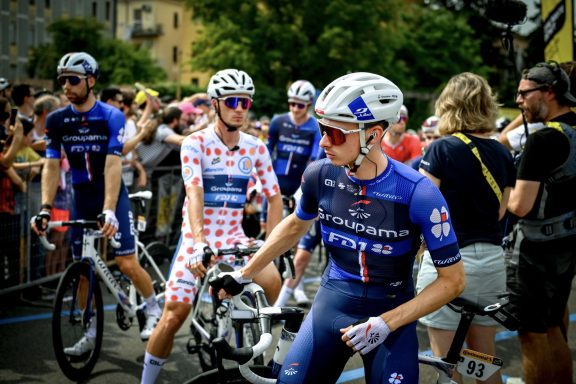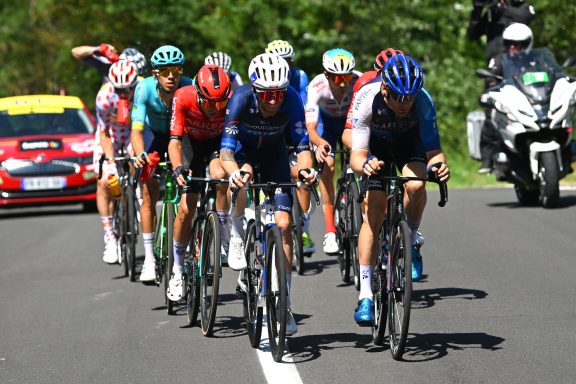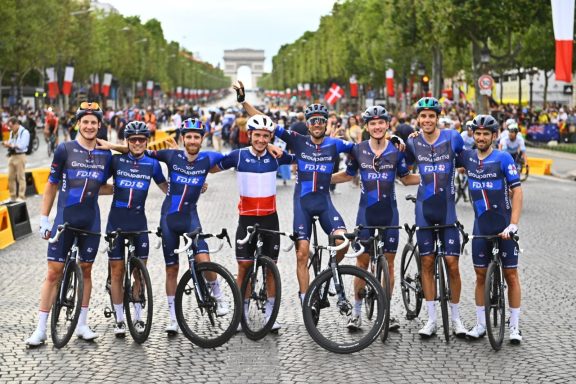The 111th Tour de France is underway. And this Saturday, from Florence to Rimini, the former French champion Valentin Madouas gave it a go for this Grand Départ in Italy. After battling at the start, he managed to enter the day’s breakaway, and led the race until the last forty kilometres. Unfortunately, the Frenchman couldn’t hold the wheel of Romain Bardet and Frank van den Broek in the final, and those two eventually made it to the line, with the French climber taking victory and the yellow jersey. Not yet at his best after suffering from Covid recently, David Gaudu is already out of contention in GC.
According to the race director Christian Prudhomme himself, the first stage of the 2024 Tour de France could also be considered as the most difficult start ever in the history of the “Grande Boucle”. And for good reason. From the city of the Renaissance, Florence, to the seaside resort of Rimini, no less than 3,600 metres of elevation gain had to be covered on Saturday for the peloton, across seven classified hills, and over more than two hundred kilometres (206, editor’s note). Everything therefore promised a tough day, especially given the day’s temperature. Yet, the pack was ready to lead the battle at 12:46 p.m., and Valentin Madouas was one of the very first to get into it. Quentin Pacher also tried his luck, but it was indeed the former French champion who managed to feel the good move after some fifteen kilometres of racing. “I wanted to be at the front at all costs,” he said. “It’s also the kind of day where you can drink and spray yourself with water much more easily when you’re in front than when you’re behind.” “The goal was to take the breakaway today,” confirmed Benoît Vaugrenard. “Valentin was very motivated, and we didn’t know what could happen behind him, especially given the heat. We had to try.”
“We knew that it was going to be very difficult for David”, Benoît Vaugrenard
The first goal of the day was therefore fulfilled, and Valentin Madouas got the company of Matej Mohoric, Ion Izagirre, Clément Champoussin, Frank van den Broek, Sandy Dujardin and Mattéo Vercher, then was joined a little further by Jonas Abrahamsen and Ryan Gibbons. However, it was only at the start of the first climb that the leading group could really increase its gap, gaining more than five minutes on the peloton. “I hoped it would go to the end, I felt the group was working well together,” added Valentin. “We managed the first part well, then we made a big push, and we gained ground quite easily.” However, the peloton also decided to put on a strong pace coming to the Barbotto climb, 75 kilometres from the finish, and this had a double consequence. The gap of the breakaway was reduced by half, and David Gaudu found himself in trouble, like a large part of the peloton. “He just hasn’t recovered from the Covid yet,” Benoît explained. “Given his feelings over the last few days, we knew it was going to be complicated. He was unable to train as he wanted, and given the level, the difficulty of the course and the heat, we knew that it was going to be very difficult. He was still weakened. It would have been better for him to start with a flat stage, but that’s racing.”
“The heat killed me”, Valentin Madouas
After Barbotto’s very fast climb, the pack was only made of around fifty men, without any member of the Groupama-FDJ cycling team. “We expected better, obviously,” said Benoît. “We hoped that Romain would be in the first group and that didn’t happen. It’s the day’s disappointment.” All hopes were then on Valentin Madouas, who continued his day up front within a reduced break. On the San Leo climb, the Frenchman was also joined by Romain Bardet, who attacked from the peloton. Four men then tackled the Montemaggio climb (4 km at 6.5), the day’s penultimate one, one minute and thirty seconds ahead of the peloton. In the wheel of Bardet and Van den Broek, the Groupama-FDJ puncher fought hard, but was finally forced to let the duo go halfway through the climb. “I wasn’t missing much, but I paid for my previous efforts,” said Valentin, regarding his few sprints for the mountain classification. “When you make such efforts under 35-40 degrees, you pay for it. The heat killed me. I told Romain that I was ready to ride with them if I managed to get over the climb, but I didn’t succeed.”
On the final climb, the Frenchman was also caught and dropped by the bunch. In the lead, the duo from DSM-firmenich PostNL narrowly resisted a peloton of around forty riders, and Romain Bardet won the stage and the first yellow jersey. Valentin Madouas came to the finish 1’41 later. “I think I’m 100%, I’ll just have to recover well, and it will be better when it’s less hot,” he smiled. David Gaudu came to the line much later. “We’re going to take it day by day, he first needs to get back into the race’s rhythm,” Benoît said. “Then we’ll see what we can do. We hope that he will recover and progress in this Tour. For Valentin, it’s promising. We will have to continue on this path, being offensive, but we will have to target the stages smartly.”



No comment